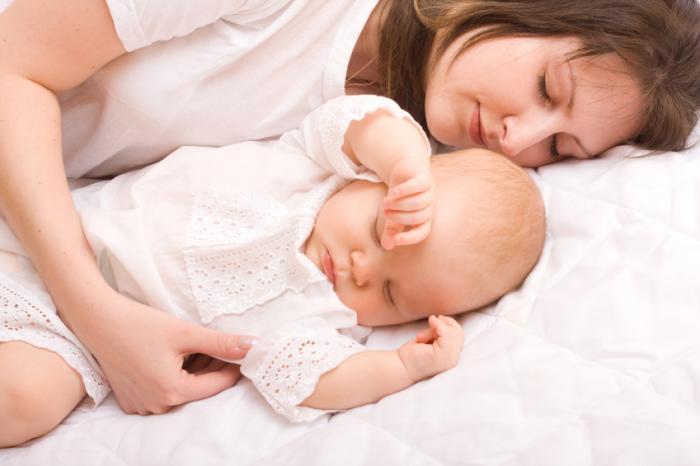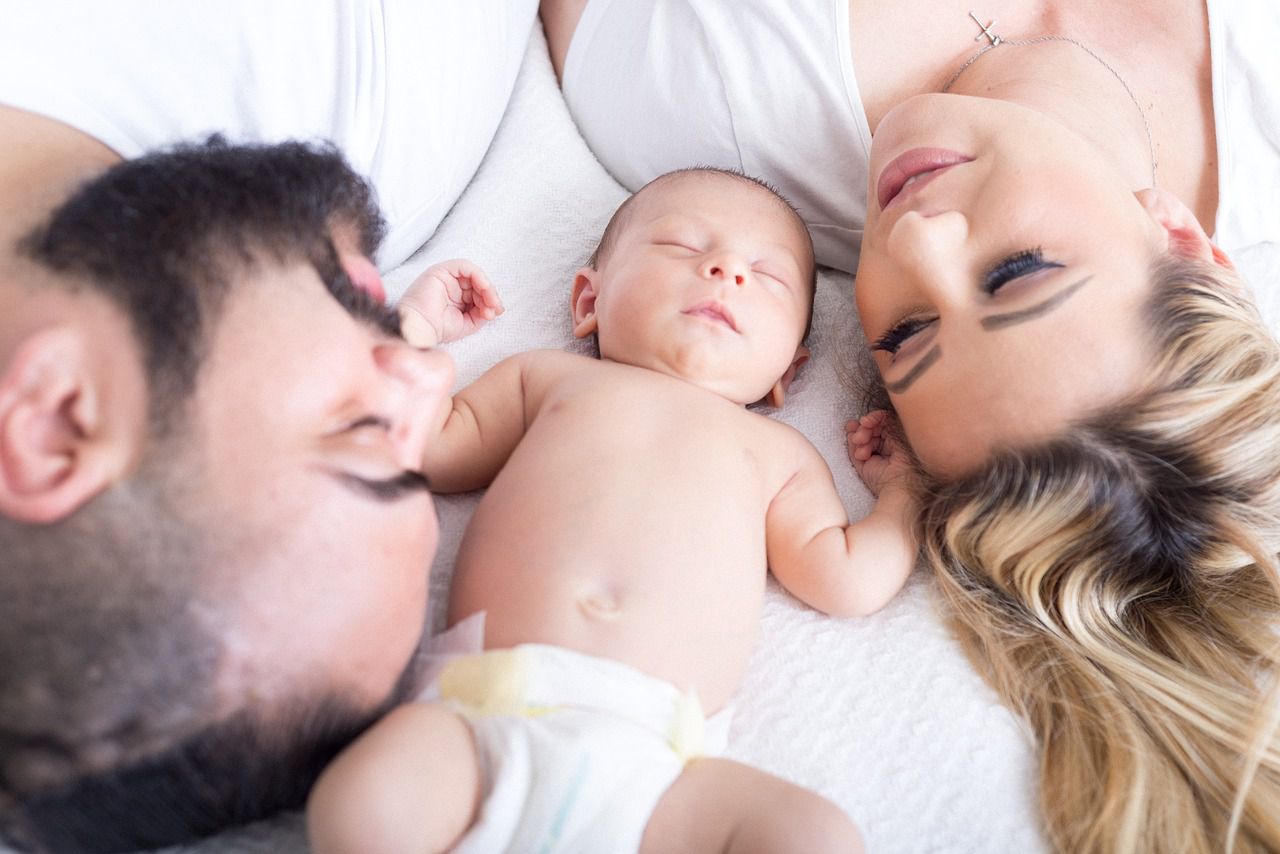Dangers of Infants Sleeping in Bed With Parents
Sleeping with an infant in the same bed as their parents, known as co-sleeping, can have dangerous consequences. Infants who sleep in the same bed as their parents are at greater risk for suffocation due to a lack of space or too much softness on the mattress. Additionally, infants can get entangled in bedding and become trapped.
In addition to physical danger, co-sleeping also has been linked to an increased risk of Sudden Infant Death Syndrome (SIDS). For this reason, it is important that infants sleep alone in a crib or bassinet next to their parent’s bed until they reach 1 year old. This practice keeps them safe while still allowing parents easy access throughout the night if needed.
The American Academy of Pediatrics (AAP) warns that sharing a bed with an infant can be extremely hazardous and potentially fatal. Bed-sharing increases the risk of Sudden Infant Death Syndrome (SIDS), suffocation, entrapment, and strangulation. Even if parents take precautions such as removing soft items like pillows or blankets from the bed, there is still a significant risk associated with co-sleeping.
The AAP recommends placing infants in their own sleep space such as a crib or bassinet to ensure they get safe and restful sleep.
Co Sleeping Killed My Baby
Co-sleeping is a controversial topic, and one that every parent should research thoroughly before making the decision to do it. Sadly, in some cases co-sleeping can have deadly consequences. In 2013, an infant in Louisiana died while co-sleeping with his parents; an autopsy confirmed the cause of death as sudden infant death syndrome (SIDS).
Though SIDS can occur even when infants are not sleeping with their parents, it’s important to understand the risks associated with bed sharing and take steps to reduce them if you decide to do so.
Psychological Effects of Child Sleeping With Parents
Sleeping with parents can have a variety of psychological effects on children. It is important to remember that the decision to allow their child to sleep in their bed should be made by considering both the short and long-term implications for both parent and child. In some cases, it may add a sense of comfort and security for young children, while in other cases it could lead to unhealthy attachment patterns or difficulty sleeping independently later on.
Ultimately, each family must decide what feels right for them as they strive to provide a safe, secure environment where their child can thrive.
Baby Sleeping in Arms Sids
Babies should not be put to sleep in the arms of their parents or caregivers due to an increased risk of SIDS (sudden infant death syndrome). The American Academy of Pediatrics recommends that babies always be placed on their backs for sleep, in a crib or bassinet with nothing but a tight-fitting sheet. Aiming for at least 8–12 hours of uninterrupted sleep every night is also important.
Why is Co Sleeping Dangerous
Co-sleeping is when a baby shares a bed or sleeping surface with an adult. Although some people believe that co-sleeping can be beneficial, it can also be very dangerous for young children. The American Academy of Pediatrics warns that the risk of sudden infant death syndrome (SIDS) increases significantly when babies are sharing a bed or sleeping surface with an adult.
Other dangers associated with co-sleeping include suffocation, strangulation and overheating. Therefore, parents should always practice caution if considering co-sleeping and ensure their child has its own safe sleeping space whenever possible.
Co Sleeping Bed
Co-sleeping beds are becoming increasingly popular among parents who want to sleep in the same bed as their baby. Unlike traditional cots and cribs, co-sleeping beds provide a safe environment for both parent and child to sleep together. They usually feature side guards or panels that help prevent your baby from rolling out of bed during the night, while also providing a secure sleeping space for them.
Co-sleeping beds can be beneficial for both parents and babies by providing an easy way to breastfeed at night, as well as allowing parents to monitor their baby’s breathing more easily throughout the night.
Can Baby Sleep in My Bed If I’M Awake
It is generally not recommended for babies to sleep in the same bed as their parents while they are awake. If a baby is sharing an adult’s bed, it should be done only when both the parent and baby are sleeping. Parents should make sure that there are no loose blankets or pillows around the baby during this time and that no one else is on the bed with them who could roll over onto the baby.
When is a Child Too Old to Sleep With Parents
When it comes to determining when a child is too old to sleep with their parents, there is no definitive answer. Some experts suggest that children should transition out of the parental bed by age 4 or 5, while other sources recommend 6–7 years of age as an appropriate cutoff. Ultimately, this decision should be based on family dynamics and individual comfort levels; if everyone involved feels comfortable with the arrangement then there’s no need for alarm.
Can Baby Sleep on Bed Supervised
It is important to note that baby sleep on bed should always be supervised. It is not safe for a baby to sleep on top of an adult mattress without any form of supervision, as babies can roll off the surface and suffer serious injury or death. If you do decide to let your baby sleep on the bed with you, it is recommended that they are placed in between adults in the center of the bed and use barriers such as railings or bumpers around them so that they are unable to roll off the bed.
Additionally, ensure all pillows and blankets are kept away from your little one’s face during their nap time.

Credit: www.medicalnewstoday.com
Is It Bad for a Child to Sleep in Parents Bed?
The debate about whether or not it is bad for a child to sleep in their parents’ bed has been ongoing for some time. As with many parenting decisions, there are both pros and cons of this arrangement. On one hand, sleeping in the same bed can create a strong bond between parent and child, helping them to feel secure and safe while promoting better communication between them through cuddling and talking.
This type of arrangement might also make nighttime easier on busy parents who don’t have extra energy available at night to get up multiple times when their children wake up crying or scared. On the other hand, allowing your children to sleep in your bed could lead to problems down the road as they become older due to establishing poor boundaries around sleeping arrangements that are difficult to break later on. Additionally, research suggests that having babies share beds with parents is associated with an increased risk of SIDS (sudden infant death syndrome).
Overall, whether or not you decide for your child to sleep in your bed should be determined by what works best for you as a family unit; however it is important to keep in mind potential risks involved with doing so before making a decision either way.
Can Babies Sleep Next to You in Bed?
Yes, babies can sleep next to you in bed. Co-sleeping with your baby is a great way to keep them close and safe while they sleep. It also makes it easier for you to feed and comfort your little one during the night, especially if they’re not used to sleeping alone yet.
However, there are some safety issues that should be taken into consideration when co-sleeping with an infant. Make sure the mattress is firm, free of pillows and blankets (no fluffy duvets), and that there’s no space between the bed frame or wall where your baby could get stuck or trapped in any way. Additionally, never share a bed with someone who has been drinking alcohol or using drugs as this increases the risk of Sudden Infant Death Syndrome (SIDS).
Overall though, co-sleeping can be a wonderful bonding experience for both parent and child!
What are the Risk Factors for Bed Sharing Mother And Baby Sleeping Together?
Bed sharing has long been a tradition in many societies but there are potential risks that parents should be aware of before making the decision to share a bed with their baby. Risk factors for mother and baby sleeping together can include increased risk of sudden infant death syndrome (SIDS), suffocation, entrapment from bedding or furniture, falls, overheating and blocked airway due to parental sleeping position. Additionally, young babies may not have developed the motor skills necessary to move away safely from an adult’s body if they become uncomfortable during sleep.
In order to reduce these risks when considering bed-sharing mothers should ensure that there is no soft objects such as pillows and blankets near the baby’s face which could obstruct breathing; use firm mattresses without any dips and valleys; avoid drinking alcohol or taking drugs before going to sleep; remove all clutter such as toys and books from the shared surface area; always put your baby on his/her back when placed in the bed; keep their head uncovered while sleeping so they don’t overheat.
What Age Should You Stop Sleeping With Your Baby?
When it comes to deciding when you should stop sleeping with your baby, the answer is not an exact one. While most experts recommend that parents begin transitioning their child out of their bed around age 1, there are some factors to consider before making this decision. Some families feel comfortable co-sleeping for longer periods of time, while others believe that babies should move into separate beds as soon as possible.
Ultimately, the choice lies in what works best for both parent and child – if they’re both getting a good night’s sleep and are happy with their arrangement then don’t worry about changing it too much until everyone feels ready to make the switch. Before making any decisions though, be sure to do your research and consult with your pediatrician or other health professional so that you can make an informed choice based on all of the available information.
Mom hopes baby’s co-sleeping death warns others
Conclusion
In conclusion, sleeping in the same bed as an infant can be dangerous and should be avoided if possible. Co-sleeping is a risk factor for SIDS, suffocation, entrapment, and strangulation. Keeping cribs or bassinets close to the bed so that parents can quickly respond to their baby’s needs is much safer than co-sleeping in the same bed with your little one.
Ultimately it’s up to each parent to decide what works best for them but understanding the potential risks of co-sleeping is important before making any decisions.

